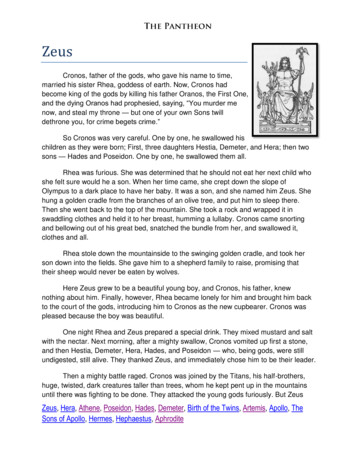
Transcription
ZeusCronos, father of the gods, who gave his name to time,married his sister Rhea, goddess of earth. Now, Cronos hadbecome king of the gods by killing his father Oranos, the First One,and the dying Oranos had prophesied, saying, “You murder menow, and steal my throne — but one of your own Sons twilldethrone you, for crime begets crime.”So Cronos was very careful. One by one, he swallowed hischildren as they were born; First, three daughters Hestia, Demeter, and Hera; then twosons — Hades and Poseidon. One by one, he swallowed them all.Rhea was furious. She was determined that he should not eat her next child whoshe felt sure would he a son. When her time came, she crept down the slope ofOlympus to a dark place to have her baby. It was a son, and she named him Zeus. Shehung a golden cradle from the branches of an olive tree, and put him to sleep there.Then she went back to the top of the mountain. She took a rock and wrapped it inswaddling clothes and held it to her breast, humming a lullaby. Cronos came snortingand bellowing out of his great bed, snatched the bundle from her, and swallowed it,clothes and all.Rhea stole down the mountainside to the swinging golden cradle, and took herson down into the fields. She gave him to a shepherd family to raise, promising thattheir sheep would never be eaten by wolves.Here Zeus grew to be a beautiful young boy, and Cronos, his father, knewnothing about him. Finally, however, Rhea became lonely for him and brought him backto the court of the gods, introducing him to Cronos as the new cupbearer. Cronos waspleased because the boy was beautiful.One night Rhea and Zeus prepared a special drink. They mixed mustard and saltwith the nectar. Next morning, after a mighty swallow, Cronos vomited up first a stone,and then Hestia, Demeter, Hera, Hades, and Poseidon — who, being gods, were stillundigested, still alive. They thanked Zeus, and immediately chose him to be their leader.Then a mighty battle raged. Cronos was joined by the Titans, his half-brothers,huge, twisted, dark creatures taller than trees, whom he kept pent up in the mountainsuntil there was fighting to be done. They attacked the young gods furiously. But ZeusZeus, Hera, Athene, Poseidon, Hades, Demeter, Birth of the Twins, Artemis, Apollo, TheSons of Apollo, Hermes, Hephaestus, Aphrodite
had allies too. He had gone to darker caverns — caves under caves under caves, deepin the mountainside — formed by the first bubbles of the cooling earth. Here, Cronos,thousands of centuries before - (a short time in the life of a god) had pent up othermonsters, the one-eyed Cyclopes, and the Hundred-handed Ones. Zeus unshackledthese ugly cousins and led them against the Titans.There was a great rushing and tumult in the skies. The people on earth heardmighty thunder, and saw mountains shatter. The earth quaked and tidal waves rolled asthe gods fought. The Titans were tall as trees, and old Cronos was a crafty leader. Heattacked fiercely, driving the young gods before him. But Zeus had laid a trap. Halfwayup the slope of Olympus, he whistled for his cousins, the Hundred-handed Ones, whohad been lying in ambush. They took up huge boulders, a hundred each, and hurledthem downhill at the Titans. The Titans thought the mountain itself was falling on them.They broke ranks, and fled.The young goat-god Pan was shouting with joy. Later he said that it was hisshout that made the Titans flee. That is where we get the word “panic.”Now the young gods climbed to Olympus, took over the castle, and Zeus becametheft king. No one knows what happened to Cronos and his Titans. But sometimesmountains still explode in fire, and the earth still quakes, and no one knows exactly why.One story says that Zeus killed Cronos with a scythe — the same one thatCronos had used on Oranos. Perhaps this is the real meaning behind the greeting-cardpictures we exchange on New Year‟s Day, a rosy little baby confronting an old man whocarries a scythe. Memories of the old gods crop up in odd places.HeraNow these gods reigned for some three thousand years. Therewere many of them, but twelve chief ones. Zeus married his sisterHera — a: family habit. They were always quarreling. He angered herby his infidelities; she enraged him with her strategies. She was thequeen of intriguers, and always found it easy to outwit Zeus who wasbusy with many things.Once, she persuaded the other gods into a plot against him. She drugged hisdrink; they surrounded him as he slept, and bound him with rawhide thongs. He ragedand roared and swore to destroy them, but they had stolen his thunderbolt, and heZeus, Hera, Athene, Poseidon, Hades, Demeter, Birth of the Twins, Artemis, Apollo, TheSons of Apollo, Hermes, Hephaestus, Aphrodite
could not break the thongs. But his faithful cousin, the Hundred-handed Briareus, whohad helped him against the Titans, was working as his gardener. He heard thequarreling under the palace window, looked in, and saw his master bound to the couch.He reached through with his hundred long arms, and unbound the hundred knots.Zeus jumped from the couch and seized his thunderbolt. The terrified plotters fellto their knees, weeping and pleading. He seized Hera and hung her in the sky, bindingher with golden chains. And the others did not dare to rescue her, although her voicewas like the wind sobbing. But her weeping kept Zeus awake. In the morning he said hewould free her if she swore never to rebel again. She promised, and Zeus promised tomend his ways too. But they kept watching each other.Zeus was king of the gods, lord of the sky. His sister Demeter was the earthgoddess, lady of growing things. His sister Hera was also his wife, queen of the gods.His brother Poseidon, was god of the sea, His other brother, Hades, ruled a darkdomain, the underworld, the land beyond death.The other gods in the Pantheon were Zeus‟s children; three of them were alsoHera‟s. These were Ares, the god of war; Hephaestus, the smith-god, forger of weapons;and Eris, goddess of discord, who shrieks beside Ares in his battle chariot. The rest ofZeus‟s children were born out of wedlock. Three of them entered the Pantheon.The first was Athene, and the story of how she was born is told in the nextchapter.AtheneZeus was strolling on Olympus one morning, and noticed anew maiden walking in his garden. She was Metis, a Titaness,daughter of one of his old enemies. But the war was long ago, andshe was beautiful. He charged down the slope after her.She turned into a hawk and flew away. He turned into a hawkand flew after. She flew over the lake and dived in and became a fish.He became a fish and swam after her. She climbed on the bank, andbecame a serpent and wriggled away. He changed himself into aserpent, and wriggled after, and caught her.Zeus, Hera, Athene, Poseidon, Hades, Demeter, Birth of the Twins, Artemis, Apollo, TheSons of Apollo, Hermes, Hephaestus, Aphrodite
After he left her, he heard a bird cry and a fish leap, and those wild soundscombined to become a prophecy, which the rattling leaves echoed. “Oh, Zeus, Metis willbear a child, a girl child. But if she bears again, it will be a son who will depose you asyou deposed Cronos.”The next day Zeus walked in his garden again, and found Metis there. This timeshe did not flee. He spoke softly to her, and smiled. She came to him. Suddenly, heopened his mouth and swallowed her.That afternoon he suffered a headache — the worst headache that anyone, godor mortal, had suffered since the beginning of time. It was exactly as if someone wereinside him with a. spear, thrusting at all the soft places in his head. He shouted forHephaestus, who came rushing up with hammer and wedge. Zeus put his head on theanvil, and1 Hephaestus split the mighty skull; then he leaped back, frightened, becauseout of the head sprang a tall maiden in armor, holding a long spear.This was Athene, the gray-eyed, the wide-browed. The manner of her birth gaveher domain over intellectual activities. It was she who taught man how to use tools. Shetaught him to invent the ax, the plough, the ox-yoke, the wheel, and the sail. She taughthis wife to spin and weave. She concocted the science of numbers and taught it to man— but never to woman. She hated Ares, and took great pleasure in thwarting him on thefield of battle. For all his mighty strength, she often beat him, because she was amistress of strategy. Before battle, captains prayed to her for tactics. Before trial, judgesprayed to her for wisdom. It was she who stated that compassion was the best part ofwisdom. The - other gods didn‟t know what she meant by this. But some menunderstood and were grateful. All in all, she was perhaps the best-loved god in thePantheon; the people of Athens named their beautiful city after her.There are many stories about Athene — about her skill in battle, her wisdom, andher kindliness. But, like the other gods, she was also very jealous. One of the beststories is that of Arachne.Arachne was a young girl who lived in Lydia, famous for its purple dye. Her joywas weaving, and she wove the most beautiful things anyone had ever seen: cloaks solight you could not feel them about your shoulders, but warmer than fur; tapestrieswrought with pictures so marvelous that birds would fly through the window and try toeat the cherries off the woven bough. She was a very young girl, and everyone praisedher — and soon she began to praise herself.Zeus, Hera, Athene, Poseidon, Hades, Demeter, Birth of the Twins, Artemis, Apollo, TheSons of Apollo, Hermes, Hephaestus, Aphrodite
She said, “I, I am the greatest weaver in all the world. The greatest since theworld began, no doubt. In fact, I can weave better than Athene herself.”Athene heard this, of course. The gods are very quick to hear criticism, and veryswift to act. So she came to earth, to the little village where Arachne lived.The girl was inside, spinning. She heard a knock at the door, and opened it.There stood a lady so tall, so sternly beautiful that Arachne knew she must be agoddess, and she was afraid she knew which one. She fell on her knees. Far above herhead she heard a voice speaking softly, saying terrible things.“Yes, miserable girl, I am Athene. I am the goddess you have mocked. Is thereany reason I should not kill you?” Arachne shook her head, weeping. She could notanswer.“Very well,” said Athene. “Prepare yourself for death. You have defied the gods,and must die.”Then Arachne stood up and said, “Before I die, great Athene, let me give you apresent.” She went in and took a lovely cloak she had woven, and gave it to her. Andsaid: “Take this cloak. It must often get cold, up high on Olympus. This will shield youfrom the wind. Please take it. I am sure you have nothing so fine.”Athene shook her head and said, “Poor child. You are being destroyed by yourown worth. Your talent has poisoned you with pride like the sting of a scorpion. So thatwhich makes beauty brings death. But it is a handsome cloak, and I appreciate the gift. Iwill give you one chance. You have boasted that you can spin and weave better than I.than I, who invented the loom and the spinning, wheel, the distaff and the spindle, andout of the fleece of the clouds wove the first counterpane for my father, Zeus, who likesto sleep warm, and dyed it with the colors of the sunset. But, you say you can weavebetter than I. Very well, you shall have a chance to prove it. And your own villagers shalljudge. Seven days from today, we shall meet. You will set your spinning wheel in thatmeadow, and I shall be in my place, and we shall have a contest. You will weave whatyou will, and I shall do so too. Then we will show what we have done, and the peoplewill judge. If you win, I shall withdraw the punishment. If you lose, it is your life. Do youagree?”“Oh, yes,” said Arachne. “Thank you, dear goddess, for sparing my life.”“It is not yet spared,” said Athene.Zeus, Hera, Athene, Poseidon, Hades, Demeter, Birth of the Twins, Artemis, Apollo, TheSons of Apollo, Hermes, Hephaestus, Aphrodite
The word flashed from village to village. When the time came, not only Arachne‟sneighbors, but all the people in the land had gathered in the great meadow to watch thecontest. Arachne‟ house was the last in the village, and faced the great meadow. Shehad set up her loom outside the door. Athene sat on a low flat hill overlooking the field.Her loom was as large as Arachne‟s cottage.The girl went first. At the sight of her sitting spinning there in the sunlight, thecrowd pushed in so close she hardly had room to work. Her white hands danced amongthe flax, and she worked so quickly, so deftly, that she seemed to have forgotten theloom, and to be weaving in the air. Swiftly and more swiftly she tapped on the wool withher fingers, making it billow and curl, then rolling it quickly into a ball, then shaking it outagain; straining the wool into long shining threads with quick little pokes of her thumb ather spindle. It was said that her working was as beautiful as her work, and when shewas told that, she always smiled and said, “It is the same thing.” So she wove, and thepeople watched. Then the finished cloth began to come from the loom, and everybodylaughed to see, for they were joyous scenes. Morning scenes: a little boy and a little girlrunning in a green field among yellow flowers, chased by a black dog; a maiden at awindow dreamily combing her hair; a young man watching the sea, counting the waves.And, later, in a purple dusk, that same young man and girl standing under a tree lookingat each other. Swiftly and more swiftly the white hands danced between loom andspindle. She wove bouquets of flowers for the wedding, and a wedding gown for thebride, and a gorgeous cloak for the young husband. And, remembering what Athenehad said before, she spun a counterpane for their bed. Each square not a block of color,but a little picture — one from the childhood of the man, one from the childhood of thebride, all together, mixing, as their memories would mix now.The counterpane was last. When she arose and snapped it out, the peoplegasped and laughed and wept with joy. And Arachne curtsied toward the low hill, andAthene began to spin.The goddess had conjured up a flock of plump white woolly clouds about herhilltop. So she did not have to comb fleece or draw thread; she used cloud-wool, thefinest stuff in all the world. And she dyed it with the colors of the dawn, and the colors ofthe sunset, and the colors of sleep, and the colors of storm. Now the whole western partof the sky was her loom. She flung great tapestries across the horizon. Scenes fromOlympus — things that mortal man had never hoped to see. Almost too terrible to see Cronos cutting up Oranos with a scythe Zeus charging across the firmament with hisHundred handed Ones, shattering the Titans. the binding of Zeus, the punishment ofHera. Zeus chasing Metis as hawk and fish and snake. Then the birth of Athene herself,Zeus, Hera, Athene, Poseidon, Hades, Demeter, Birth of the Twins, Artemis, Apollo, TheSons of Apollo, Hermes, Hephaestus, Aphrodite
springing from Zeus‟s broken head. Then, more quiet scenes. Athene teaching the artsto man. Teaching him to plough, to sail, to ride in chariots; teaching the women to spin.And, then, finally — muddling it all up, poking her long spindle among the woven cloudsand mixing them and stirring up a dark strange picture — the future of man. Mangrowing huge and monstrous, his trees turning to spikes, his fields to stone. Swollenand dropsical with pride, building something so loathsome he had to look away while hewas making it.This was too much for the multitude. The vast crowd fell on its knees and wept.Arachne was watching She had never moved from the time Athene had started to work,but stood there straight with pale face and glittering eyes, watching. And when thepeople fell on their knees, she turned and went away. She walked quietly to a grove oftrees and there took a rope and hanged herself.Athene came down from the bill, and spoke no word to the people, whodispersed. Then she went to the grove and saw Arachne hanging there. The girl‟s facewas black, her eyes were bulging, her hair was streaming. Athene reached her long armand touched the girl on the shoulder. The face grew blacker, and the eyes bulged more.The body shrank; the arms and legs dwindled and multiplied. Then Athene touched therope. It shriveled, growing thinner and thinner, until it was a frail shining strand. Andthere at the end of this shining silken hair swung a small hairy creature with many legs.It looked at Athene, then turned and scuttled up its thread, drawing it up as itclimbed. It floated away over the grass until it came to a low bush, and cast anotherloop, and sat there practicing, for it knew that now it was meant to spin without rivalryuntil the end of time.That is why spiders are called Arachnids by those who know them best.PoseidonAfter Cronos was deposed, the three sons threw dice for hisempire. Zeus, the youngest, won — and chose the sky. Poseidonsmiled to himself because the sky was empty, and he knew that theimpulsive Zeus had chosen it because it looked so high. And now, he,Poseidon, could choose as he would have done if he had won. Hechose the sea. He had always wanted it; it is the best place foradventures and secrets, and makes claim on land and sky. Hades,who was always unlucky, had to take the underworld. The earth washeld as a commonwealth, and left to the goddesses to manage.Zeus, Hera, Athene, Poseidon, Hades, Demeter, Birth of the Twins, Artemis, Apollo, TheSons of Apollo, Hermes, Hephaestus, Aphrodite
Poseidon left Olympus and came to his kingdom. He immediately set aboutbuilding a huge underwater palace with a great pearl and coral throne. He needed aqueen, and chose Thetis, a beautiful Nereid, or water nymph. But it was prophesied thatany son born to Thetis would be greater than his father, so Poseidon decided to tryelsewhere. (The prophecy came true. The son of Thetis was Achilles, Who undoubtedlywas greater than his father Peleus.)Poseidon chose another Nereid named Amphitrite. But like his brother Zeus, hewas a great traveler, and had hundreds of children in different places. He was a verydifficult god, changeful and quarrelsome. Although he did bear grudges, he could bepleased, and then his smile was radiant. He liked jokes, and thought up very curiousforms for his creatures. He liked to startle nymphs with monsters, and concocted theoctopus, the squid, the sea-polyp or jellyfish, the swordfish, blowfish, sea cow, andmany others. Once, trying to appease Amphitrite‟s jealous rage, he thought up thedolphin, and gave it to her as a gift.He was greedy and aggressive, always frying to add to his kingdom. Once, heclaimed Attica as his own, and stabbed his trident into the hillside where the Acropolisstill stands, and a spring of salt water spouted. Now, the people of Athens did not wantto belong to the kingdom of the sea. They were afraid of Poseidon, who had a habit ofseizing all the youth of a town when he was in the mood. So they prayed to be putunder the protection of another god. Athene heard their prayers. She came down andplanted an olive tree by the side of the spring. Poseidon was enraged. His facedarkened and he roared with fury, raising a storm. A fishing fleet was blown off the seaand never came to port. He challenged Athene to single combat, and threatened to stirup a tidal wave to break over the city if she refused. She accepted. Zeus heard thesound of this quarreling. He came down and decreed a truce. Then all the gods sat incouncil to hear the rival claims. After hearing both Athene and Poseidon, they voted toaward the city to Athene because her olive tree was the better gift. After that, Athenianshad to be very careful when they went to sea, and were often unfortunate in their navalbattles.Poseidon was very fond of Demeter, and pursued her hotly whenever he thoughtabout it. He cornered her, finally, one hot afternoon in a mountain pass, and demandedthat she love him. She didn‟t know what to do — he was so huge, so implacable, sopersistent.Finally, Demeter said, “Give me a gift. You have made creatures for the sea; nowmake me a land animal. But a beautiful one, the most beautiful ever seen.”Zeus, Hera, Athene, Poseidon, Hades, Demeter, Birth of the Twins, Artemis, Apollo, TheSons of Apollo, Hermes, Hephaestus, Aphrodite
She thought she was safe, because she believed he could make only monsters.She was amazed when he made her a horse, and gasped with delight when she saw it.And Poseidon was so struck by his handiwork that he swiftly made a herd of horsesthat began to gallop about the meadow, tossing their heads, flirting their tails, kicking uptheir back legs, and neighing joyously. And he was so fascinated by the horses that heforgot all about Demeter, and leaped on one and rode off. Later, he made another herdof green ones for his undersea stables. But Demeter kept the first herd; from that all thehorses in the world have descended.Another story says it took Poseidon a full week to make the horse. During thattime he made and cast aside many other creatures that didn‟t come out right. But hesimply threw them away without killing them, and they made their way into the World.From them have come the camel, the hippopotamus, the giraffe, the donkey, and thezebra.In another story, Demeter turned herself into a mare to escape Poseidon. But heimmediately changed himself into a stallion, galloped after her and caught her. Fromthis courtship came a wild horse, Arion, and the nymph named Despoena.Demeter was also a moon goddess. And all through mythology there is aconnection between horse and moon and sea. The she-horse is given a sea-name,“mare”; the moon swings the tides, the waves have white manes, the dripping horsesstamp on the beach, and their hooves leave moon-shaped marks. An old, old thing thathas not entirely disappeared.HadesWhen the Greeks buried their dead, they put acoin under the corpse‟s tongue so his soul could pay thefare on the ferry that crossed the river Styx. It wasCharon who rowed the boat; he was a miser. Souls whocouldn‟t pay for the ride had to wait on this side of theriver. Sometimes they came back to haunt those whohadn‟t given them the fare.On the other side of the river was a great wall. Its gate was guarded by Cerberus,a three-headed dog who had an appetite for live meat and attacked everyone but spirit.Zeus, Hera, Athene, Poseidon, Hades, Demeter, Birth of the Twins, Artemis, Apollo, TheSons of Apollo, Hermes, Hephaestus, Aphrodite
Beyond the gate, in Tartarus, was a great wide field shaded by black poplars.Here lived the dead — heroes and cowards, soldiers, shepherds, priests, minstrels,slaves. They wandered back and forth aimlessly. When they spoke they twittered likebats. Here they awaited trial by three judges — Minos, Rhadamanthys, and Aeacus.Those who had particularly displeased the gods were given special punishment.Sisyphus, an avaricious king of Corinth, must always push a huge rock uphill. Each timehe gets it halfway up, it breaks loose and rolls down to the bottom, and he must beginagain. And this he will do for all time. Tantalus who had committed a sin has been givena burning thirst, and set chin-deep in a cool, clear stream of water. But every time hebends to put his lips to the water, it shrinks away, and he can never drink. Here he willstand as long as Sisyphus rolls his stone.But these are special cases. Most of the souls were judged to be not too goodand not too bad, but simply dead. They went back to the field, which is called the Fieldof Asphodel, to wait — for nothing.Those judged to be of unusual virtue went to the Elysian Fields close by. Here itwas always holiday. The air was full of music. The shades danced and played all daylong — all night long too, for the dead need no sleep. Also, these happy spirits had theoption of being reborn on earth. Only the bravest accepted. There was a special part ofElysium called the Isles of the Blest. Here lived those who had been three times born,and three times gained Elysium.Hades and his queen lived in a great palace made of black rock. He was veryjealous of his brothers, and scarcely ever left his domain. He was fiercely possessive,gloated over every new arrival, and demanded a headcount from Charon at the close of each day. Never did he allow any of his subjects toescape. Nor did he allow a mortal to visit Tartarus, and return. There were only twoexceptions to this rule, and those are other stories.The palace grounds and the surrounding fields were called Erebos; this was thedeepest part of the underworld. No birds flew here, but the sound of wings was heard;for here lived the Erinyes, or Furies, who were older than the gods. Their names wereTisiphone, Alecto, and Megaera. They were hags, with snaky hair, red-hot eyes, andyellow teeth. They slashed the air with metal- skidded whips, and when they found avictim, they whipped the flesh from his bones. Their task was to visit earth and punishevil-doers, especially those who had escaped other punishment. They were greatlyfeared; no one dared say their name. But they were referred to as the “Eumenides” orKindly Ones. Hades valued them. They enriched his kingdom, for their attentionsZeus, Hera, Athene, Poseidon, Hades, Demeter, Birth of the Twins, Artemis, Apollo, TheSons of Apollo, Hermes, Hephaestus, Aphrodite
persuaded people to suicide. He enjoyed their conversation. When they returned toErebus after their work was done, they circled low over the palace grounds, screamingtheir tale, and the latest gossip.Hades was well-cast to rule the dead. He was violent, loathed change, and wasgiven to slow black rage. His most dramatic hour was when he kidnapped Persephoneand made her his queen. But that belongs to the next story.DemeterDemeter means “Barley-mother.” Another name for her isCeres, from which we get the word “cereal.” She was the goddessof the cornfield, mistress of planting and harvesting, lady of growingthings. Zeus was very fond of her. He always obliged her with rainwhen her fields were thirsty. He gave her two children, a boy and agirl. The girl was named Persephone, and Demeter loved her verymuch.Persephone was raised among flowers and looked like a flower herself. Her bodywas as pliant as a stem, her skin soft as petals, and she had pansy eyes. She tookcharge of flowers for her mother. She was adept at making up new kinds and namingthem.One day she went farther than usual — across a stream, through a grove of trees,to a little glade. She carried her paintpot, for she had seen a stand of tall waxy lilies shehad decided to stripe. As she was painting their faces, she saw a bush she hadn‟tnoticed before. She went to look at it. It was a very strange bush, with thick, green,glossy leaves, and hung with large red berries that trembled on their stems like drops ofblood. She stared at the bush. She didn‟t know whether she liked it or not. She decidedshe did not, and seized it by its branches, and pulled. But it was toughly rooted and hardto pull. She was used to getting her own way. She set herself and gave a mighty tug. Upcame the bush; its long roots dragged out of the ground, leaving a big hole. She tossedthe bush aside, and turned to go back to her lilies, but she heard a rumbling sound andturned back. The noise that grew louder and louder was coming from the hole. To herhorror, the hole seemed to be spreading, opening like a mouth, and the rumbling grewto a jangling, crashing din.Out of the hole leaped six black horses, dragging behind them a golden chariot.In the chariot stood a tall figure in a flowing black cape. On his head was a black crown.Zeus, Hera, Athene, Poseidon, Hades, Demeter, Birth of the Twins, Artemis, Apollo, TheSons of Apollo, Hermes, Hephaestus, Aphrodite
She had no time to scream. He reached out his long arm, snatched her into the chariot,and lashed his horses. They curvetted in the air, and plunged into the hole again. Whenthey had gone, the hole closed.Demeter was frantic when the girl didn‟t come home, and rushed out to searchfor her. The tall green-clad goddess rode in a light wicker chariot behind a swift whitehorse, a gift from Poseidon. She sped here and there, calling, “Persephone .Persephone ”. But no one answered. All night long she searched, and, as dawn broke,she came to the glade. There she saw the uprooted bush and the trampled grass. Sheleaped from her chariot. Then she saw something that stabbed her through —Persephone‟s little paintpot, overturned. She lifted her head to the sky and howled like ashe-wolf. Then she fell still, and listened. The sun was rising; the birds had begun togossip. They told each other of the heedless girl, and the strange bush, and the hole,and the chariot, and the black rider, and how surprised the girl was when he caught her.Then Demeter spoke softly, questioning the birds. They told her enough for herto know who had taken her daughter. She put her face in her hands and wept. Just thena little boy came running into the meadow to pick some flowers. When he saw Demeter,he laughed. He had never seen a grownup crying before. But when she looked up, hestopped laughing. She pointed at him, whispering, and he was immediately changedinto a lizard. But he hadn‟t learned to scuttle yet, and just sat there looking at Demeter amoment too long, for a hawk swooped and caught him. We was a lizard for only a shortwhile.Demeter climbed back into her chariot and sped to Olympus. She charged intothe throne room where Zeus sat.“Justice!” she cried. “Justice Your brother Hades has stolen my daughter —our daughter”“Peace, good sister,” said Zeus. “Compose yourself. Hades‟ courtship has beena trifle abrupt, perhaps, but after all he is my brother — our brother — and is accounteda good match. Think, sweet Demeter. It is difficult for our daughter to look beyond thefamily without marrying far beneath her
Here Zeus grew to be a beautiful young boy, and Cronos, his father, knew nothing about him. Finally, however, Rhea became lonely for him and brought him back to the court of the gods, introducing him to Cronos as the new cupbearer. Cronos was pleased because the boy was beautiful










